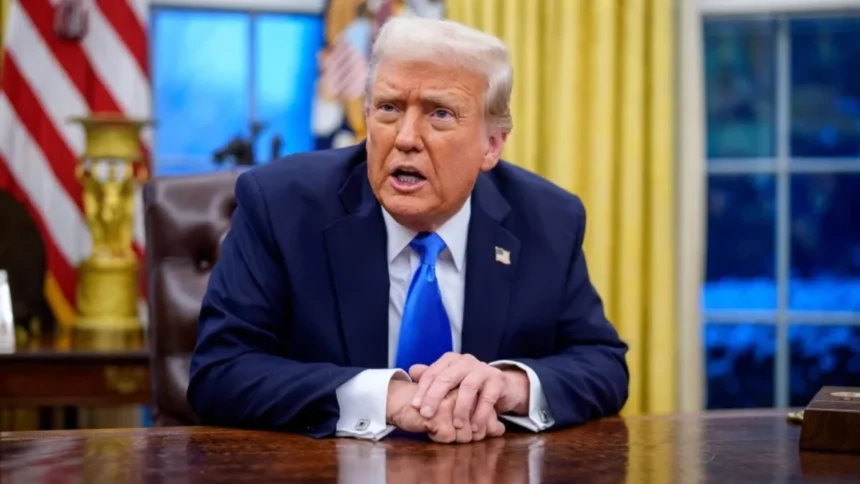In a bombshell proclamation reverberating from TruthSocial on Friday, President Donald Trump heralded what he characterized as a transformative alliance between U.S. Steel and Japan’s Nippon Steel — a multi-billion-dollar venture he contends will anchor headquarters in Pittsburgh and flood the American economy with an infusion of $14 billion in capital.
“This orchestrated synergy between United States Steel and Nippon Steel is set to birth over 70,000 jobs and infuse the American economic bloodstream with $14 billion — most of it cascading into action within the next 14 months,” Trump declared in his post, which rang with industrial bravado.
The former president, ever the showman, announced his intent to headline a “BIG rally” at the steel site next Friday — a symbolic pilgrimage to the heart of legacy manufacturing.
Yet, despite the thunderous tone, Trump’s proclamation omitted core specifics — namely, whether the proposed alignment constitutes a bona fide partnership or a veiled foreign acquisition. The granular structure — especially regarding U.S. control — remains murky.
Read Also: What is a Pledge Loan? – Complete Guide
The proposed tie-up was originally entangled in a thorny thicket of bipartisan backlash. Former President Joe Biden wielded executive authority to torpedo a $14.3 billion takeover bid by Nippon during his final days in office. Critics across the aisle raised alarms over the symbolic surrender of a storied American titan to foreign custodianship — especially one so enmeshed in the nation’s industrial folklore.
In a rare ideological convergence, Trump echoed similar apprehensions early in his term, declaring emphatically: “I don’t want U.S. Steel being absorbed by a foreign entity. Investment? Yes. Ownership? No.”
But tides shifted. By March, the Trump administration signaled a possible pivot. In a legal maneuver hinting at softened opposition, it petitioned for extensions in litigation launched jointly by U.S. Steel and Nippon Steel against CFIUS — the Committee on Foreign Investment in the United States — a powerful federal sentinel that vets overseas investment for potential national security hazards.
Come April, CFIUS initiated its rigorous review and, as Reuters reported, issued a private advisory to Trump this week. The crux? Whether proposed guardrails from both firms could sufficiently allay national security anxieties. Amid this crescendo, Nippon upped the ante — pledging a monumental $14 billion cash infusion into U.S. Steel’s domestic ventures, including a prospective $4 billion steel plant on American soil — contingent on receiving the green light.
U.S. Steel, once a colossal totem of American economic ascendancy, stood as the globe’s most valuable corporation following its 1901 inception. Its output — from the bones of bridges to the spines of skyscrapers — helped sculpt 20th-century America. But post-WWII, its luster waned, succumbing to global competition, automation, and policy shifts. Today, it no longer reigns as the preeminent U.S. steelmaker, employing a modest 14,000 domestically — 11,000 of them unionized under the United Steel Workers.
Despite diminished stature, U.S. Steel remains an emotive emblem — especially in battleground states like Pennsylvania, where steel is more than metal; it’s memory, legacy, and pride.
Read Also: Charles Scharf Net Worth [2025] – CEO of Wells Fargo
In a Friday communiqué to CNN, U.S. Steel cast Trump as “a bold leader and businessman,” asserting that, “U.S. Steel shall remain American. Through a partnership with Nippon Steel, we will expand, innovate, and unleash thousands of new jobs and cutting-edge technologies over the coming four years.”
Not all were placated. The United Steel Workers union eviscerated the deal in a withering statement Thursday, warning that greenlighting Nippon’s acquisition would spell “catastrophe for American steelworkers, jeopardize our national security, and mortally wound U.S. manufacturing’s future.”
“President Trump has publicly pledged to veto this sale since January 2024. We urge him to follow through decisively, slamming the gate shut on this corporate betrayal of American steel and safeguarding our industrial sovereignty,” the union exhorted.
Read Also: 11% Drop in Waaree and Premier Energies Stocks: Here is Why?
Despite labor’s ire, political voices from the Keystone State lent contrasting tones. Republican Senator Dave McCormick endorsed the move, lauding it as a maneuver to keep “U.S. Steel under U.S. stewardship,” though he abstained from offering structural particulars. Meanwhile, Democratic Senator John Fetterman minced no words, branding the original deal “a death sentence” in a scathing Friday post on X.
Pennsylvania Governor Josh Shapiro also lent his voice — in affirmation. He revealed direct conversations with Trump about the transaction, underscoring a singular priority: “Retaining and expanding jobs here in Pennsylvania while securing the most monumental investment achievable for our Commonwealth.”
The markets responded with electric optimism — U.S. Steel’s (NYSE: X) stock catapulted 21% on Friday, emboldened by the news flash.
Read Also: Brian Chesky on Building Airbnb in Crisis: Discipline Born from Recession




